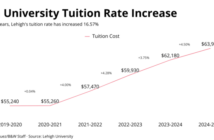When annual college tuition surpasses the price of a BMW convertible, a symbol of wealth within American society, that’s a sign that higher education is a costly investment.
Considering that the median U.S. household income was $51,017 in 2012, according to the United States Census Bureau, many students depend on financial aid to fund their college education. Financial aid packages can be a decisive factor in choosing which school to attend.
At Lehigh, the total expected cost of attendance for the ’14-’15 academic year is $58,835. More than half of Lehigh students receive financial aid, and $34,180 is the typical financial aid package, according to the Lehigh website.
This financial aid plays a crucial role in a student’s college decision and then later college experience, yet misconceptions and miscommunication between students and the Financial Aid Office cause both financial and academic issues that can be easily avoided.
Each year, students need to reapply for their financial aid. The deadline for their application is April 15, and students receive notifications about their financial aid package for that year during the middle of June at the earliest. This poses problems for students whose financial aid package may have changed. For example, if a student realizes in June that her package has decreased and she can no longer afford to attend Lehigh, her options are limited. Financing the upcoming year’s tuition on such late notice proves nearly impossible, and it would already be too late to transfer to most other schools.
Ernanie Silvestre, ’15, faced this situation a few months ago, during the fall semester of his senior year. He arrived on campus, settled into his room in Umoja House, and attended the first few days of class. He says that he received an email that Wednesday, saying that he had to resolve some issues with his financial aid. In the past, he experienced academic struggles that interfered with his financial aid, and he openly conceded that his GPA fluctuated throughout his Lehigh career.
The abrupt, significant change in his financial aid still came as a shock, though. After speaking with his financial aid adviser, he said, “That was basically when the ultimatum was there, and obviously at that point it was a little late because the semester had already started. So I was kind of left out to dry a little bit.” He listed his options as either taking a private loan elsewhere or temporarily leaving school. He chose to work toward his tuition and paying off loans this semester.
The timing of his financial aid notification left little space to react. However, the timeline already reflects the efforts of the financial aid office’s best efforts. Jennifer Mertz, the director of the financial aid office, says the office receives thousands of applications, yet only has four counselors and just over a month to review them all. She encourages families to contact the financial aid office ahead of time to initiate a conversation about possible changes in students’ financial aid packages.
Mertz also emphasizes the importance of recognizing that financial aid can change throughout a student’s four years at Lehigh and to be prepared for possible changes.
Hiyab Stefanos, ’16, another student who receives financial aid, says that the stress caused by the uncertainty surrounding financial aid each year adds significant pressure in addition to the stress of trying to succeed in her classes. The rushed timeline concerned her. “If they don’t tell you that they’re going to take away your financial aid, what are you going to do for a semester, or even a year?” she says. “You can’t do anything.”
This timing could cause significant breaks in students’ college educations, which isn’t good for Lehigh or its students.
Better communication between the financial aid office and students is key. Mertz says that financial aid tends to remain consistent throughout a student’s four years, but that it can increase or decrease due to reasons that may not be clear to students. One common example she provided was a financial aid package contingent upon whether a student has siblings in college. For first-year students, the financial aid information would be printed on an awards letter, but she says students might overlook information and not realize their aid depends on that specific condition. “To be quite honest, those messages appear on the back of a financial aid notification, and some people don’t even check there,” she says.
If a student has a sibling in college during his first year at Lehigh, his tuition might be initially low, but then when his sibling graduates, it rises. The explanation for this change can be found on the Portal for non-first-year students, but Mertz herself admits that “makes it even slightly more difficult, because they don’t even have paper form at all. They actually have to navigate to the messages section of the Portal so if they’re not doing that step, they might be missing those very important messages.”
The Financial Aid Office’s form of communication is very impersonal, which seems at odds with the fact that the office deals with students who all have such personal circumstances, Stefanos says. While Mertz encourage students and families to visit the office in person, bridging that gap from the financial aid office’s side is important, too.
Stefanos and Gladys Castellon, ’17, recommend that the Financial Aid Office create workshops on how to navigate financial aid proactively. Some information they consider valuable to students who receive financial aid clearly laying out the requirements for that aid and how to complete important forms, such as the FASFA, on their own
The Financial Aid Office should communicate with students to prepare them with the skills and expectations necessary to approach their financial aid. An education should never become a symbol comparable to a BMW convertible, and the financial aid office can help keep it that way.





Comment policy
Comments posted to The Brown and White website are reviewed by a moderator before being approved. Incendiary speech or harassing language, including comments targeted at individuals, may be deemed unacceptable and not published. Spam and other soliciting will also be declined.
The Brown and White also reserves the right to not publish entirely anonymous comments.